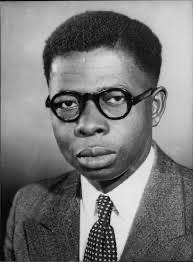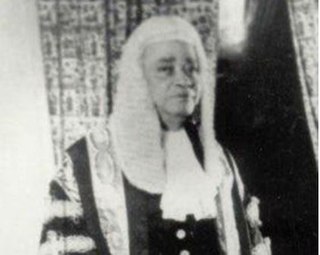Related Research Articles

Ghana Airways Limited was the flag carrier of Ghana, with its main base of operation and hub at Kotoka International Airport in Accra. The airline ceased operations in 2004, although plans were discussed to revive it in 2020 in partnership with Egyptair.

Ako Adjei, was a Ghanaian statesman, politician, lawyer and journalist. He was a member of the United Gold Coast Convention and one of six leaders who were detained during Ghana's struggle for political independence from Britain, a group famously called The Big Six. He has been recognized as a founding father of Ghana for his active participation in the immediate politics of Ghana's pre-independence era. Adjei became a member of parliament as a Convention People's Party candidate in 1954 and held ministerial offices until 1962 when as Minister for Foreign Affairs he was wrongfully detained for the Kulungugu bomb attack.
John Ebenezer Samuel de Graft-Hayford (1912–2002) was Ghana's first Ghanaian Chief of Air Staff. He became the first indigenous Air Force Commander in Ghana and Black Sub-Saharan Africa. He was also acting Chief of Defence Staff (CDS) for a brief period in 1962.

The Ghana Army is the principal land warfare force of Ghana. In 1959, two years after the Gold Coast became independent from the British Empire, the Gold Coast Regiment was withdrawn from the Royal West African Frontier Force and formed the basis for the new Ghanaian army. Together with the Ghana Air Force and Ghana Navy, the Ghana Army makes up the Ghana Armed Forces, which is controlled by the Ghanaian Ministry of Defence and Central Defence Headquarters, both of which are located in the Greater Accra Region.

Sir Emmanuel Charles Quist, also known as Paa Quist was a barrister, educator and judge who served as the first Speaker of the Gold Coast Legislative Assembly and the first Speaker of the Parliament of Ghana.
Ofeibea Quist-Arcton is a Ghanaian-British radio journalist, correspondent, commentator and broadcaster. She works for National Public Radio, reporting on issues and events related to West Africa. She grew up in Ghana, Italy, Britain, and Kenya.

Accra Academy is a boys' secondary school located at Bubuashie near Kaneshie in the Greater Accra Region, Ghana. It admits both boarding and day students. The school was established as a private school in 1931 and gained the status of a Government-Assisted School in 1950. It is the oldest existing secondary school to have been privately founded in the Gold Coast.
Ghana's most popular sport is football, followed by boxing, Athletics, Badminton and basketball.

Elizabeth II was Queen of Ghana from 1957 to 1960, when Ghana was an independent sovereign state and a constitutional monarchy. She was also queen of the United Kingdom and other sovereign states. Her constitutional roles in Ghana were delegated to the governor-general of Ghana.
Vincent Cyril Richard Arthur Charles (V.C.R.A.C.) Crabbe was a Ghanaian jurist and public servant. He was a judge of the Supreme Court of Ghana from 1970 to 1972 and from 1980 to 1982. Before his appointment on the court, he formed and headed a permanent electoral commission to conduct the 1969 Ghanaian Election. He chaired the Constituent Assembly of 1979 that deliberated over and presented a constitution for Ghana's Third Republic before his reappointment to the supreme court.

John Banks Elliott was a Ghanaian diplomat and statesman. He was Ghana's first Ambassador Extraordinary and Plenipotentiary to the Soviet Union, serving from 1960 to 1966.

Theodore Shealtiel Clerk, was an urban planner on the Gold Coast and the first formally trained, professionally certified Ghanaian architect. Attaining a few historic firsts in his lifetime, Theodore Clerk became the chief architect, city planner, designer and developer of Tema which is the metropolis of the Tema Harbour, the largest port in Ghana. The first chief executive officer (CEO) of the Ghanaian parastatal, the Tema Development Corporation as well as a presidential advisor to Ghana's first Head of State, Kwame Nkrumah, T. S. Clerk was a founding member and the first president of the first post-independent, wholly indigenous and self-governing Ghanaian professional body, the Ghana Institute of Architects (GIA), that had its early beginnings in 1963. He was also an Associate of the Royal Institute of British Architects and the Royal Town Planning Institute.

Lawrence Rosario Abavana was a Ghanaian politician and teacher by profession. He served in various ministerial portfolios in the first republic and also served as a member of the council of state in the third republic. He was a member of the Convention People's Party (CPP).
Lebrecht Wilhelm Fifi Hesse was a Ghanaian public servant and the first black African Rhodes Scholar. He served as Director-General of the Ghana Broadcasting Corporation on two occasions. He was also a member of the Public Services Commission of Ghana.
Goodwin Tutum Anim, also known by the name Isaac Goodwin Aikins, was a Ghanaian journalist. He was the first African Managing Director of the Ghana News Agency and later Executive Secretary of the Ministry of Arts and Culture.
Jacob Ofori Torto was a Ghanaian public servant. He served as Ghana's Commissioner (Minister) for Agriculture from 1967 to 1968, and Ghana's Commissioner (Minister) for Forestry from 1968 to 1969.
Gilbert Boafo Boahene was a Ghanaian civil servant who was Secretary to the Supreme Military Council, and also was Secretary to the Public Services Commission on two occasions; first in the First Republic and then in the Second Republic. He was the cabinet secretary of the S.M.C. government in Ghana at the time of its overthrow in the 1979 June 4th revolution.
David Kpakpoe Acquaye is a Ghanaian academic and agriculturalist. He was a professor of Soil Science and Crop Science, and the first head of the Soil Science department of the University of Ghana.
James Macdonald, CBE, FRSE was a British civil servant and forester.
References
- ↑ Ghana, Forestry Department (1961). Annual Report of the Forestry Dept., Ghana. Ghana Ministry Lands and Natural Resources, 1961. p. 15.
- 1 2 3 4 5 6 7 8 9 10 "E. A. Quist-Arcton". The Commonwealth Forestry Review. 52 (2 (152)): 105–107. 1973. ISSN 0010-3381. JSTOR 42605390.
- ↑ Society, University of Oxford Forest (1966). Journal.
- ↑ Journal of the Oxford University Forestry Society. Holywell Press. 1966.
- 1 2 3 4 Ghana Year Book. Graphic Corporation. 1963.
- ↑ Ghana Year Book. Graphic Corporation. 1963.